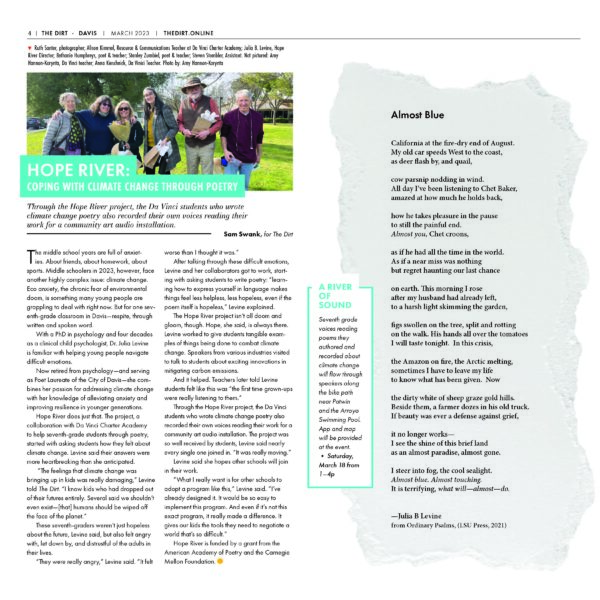Hope River, a poetry initiative designed to help middle schoolers process eco anxiety, connects with Davis 7th grade students to produce moving work.

The middle school years are full of anxieties. About friends, about homework, about sports. Middle schoolers in 2023, however, face another highly complex issue: climate change. Eco anxiety, the chronic fear of environmental doom, is something many young people are grappling to deal with right now. But for one seventh-grade classroom in Davis—respite, through written and spoken word.
With a PhD in psychology and four decades as a clinical child psychologist, Dr. Julia Levine is familiar with helping young people navigate difficult emotions.
Now retired from psychology—and serving as Poet Laureate of the City of Davis—she combines her passion for addressing climate change with her knowledge of alleviating anxiety and improving resilience in younger generations.
Hope River does just that. The project, a collaboration with Da Vinci Charter Academy to help seventh-grade students through poetry, started with asking students how they felt about climate change. Levine said their answers were more heartbreaking than she anticipated.
“The feelings that climate change was bringing up in kids was really damaging,” Levine told The Dirt. “I know kids who had dropped out of their futures entirely. Several said we shouldn’t even exist—[that] humans should be wiped off the face of the planet.”
These seventh-graders weren’t just hopeless about the future, Levine said, but also felt angry with, let down by, and distrustful of the adults in their lives.
“They were really angry,” Levine said. “It felt worse than I thought it was.”
After talking through these difficult emotions, Levine and her collaborators got to work, starting with asking students to write poetry: “learning how to express yourself in language makes things feel less helpless, less hopeless, even if the poem itself is hopeless,” Levine explained.
The outlook isn’t all doom and gloom, though. Hope, she said, is always there. Levine worked to give students tangible examples of things being done to combat climate change. Speakers from various industries visited to talk to students about exciting innovations in mitigating carbon emissions.
And it helped. Teachers later told Levine students felt like this was “the first time grown-ups were really listening to them.”
Through the Hope River project, the Da Vinci students who wrote climate change poetry also recorded their own voices reading their work for a community art audio installation. The project was so well received by students, Levine said nearly every single one joined in. “It was really moving.”
Levine said she hopes other schools will join in their work.
“What I really want is for other schools to adopt a program like this,” Levine said. “I’ve already designed it. It would be so easy to implement this program. And even if it’s not this exact program, it really made a difference. It gives our kids the tools they need to negotiate a world that’s so difficult.”
Hope River is funded by a grant from the Academy of American Poets and the Carnegie Mellon Foundation.
The community has a chance to hear the poems written and recorded by students in the Hope River project. Seventh grade voices reading poems they authored and recorded about climate change will flow through speakers along the bike path near Patwin and the Arroyo Swimming Pool. A smartphone app and map will be provided at the event.
As seen in print:





